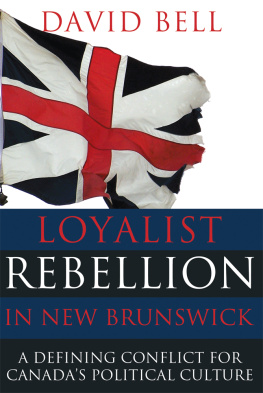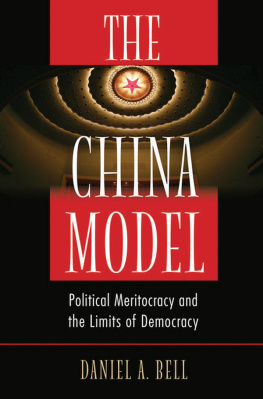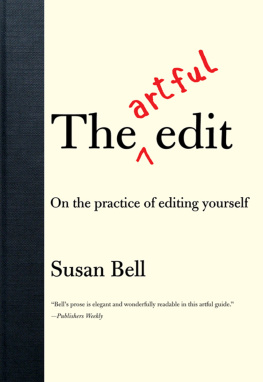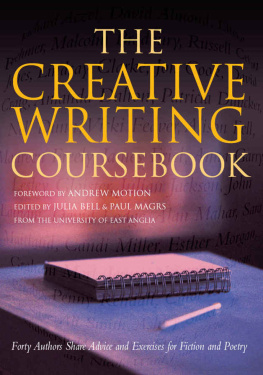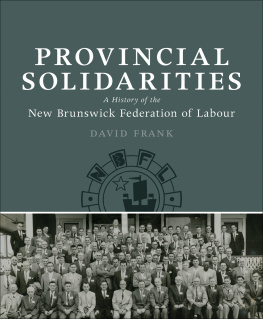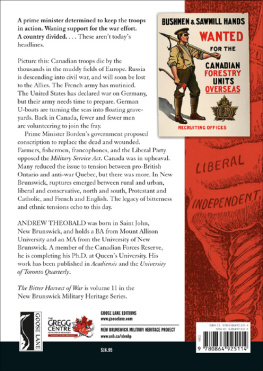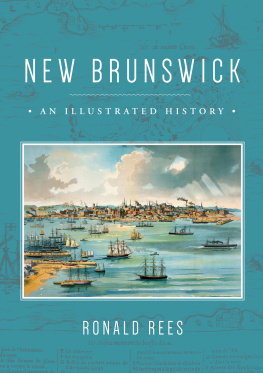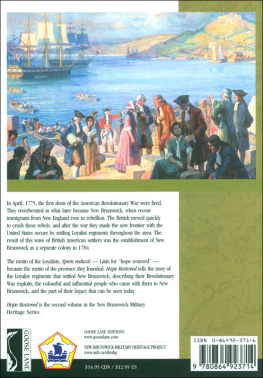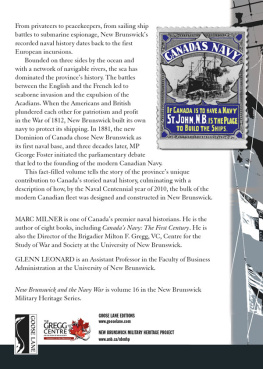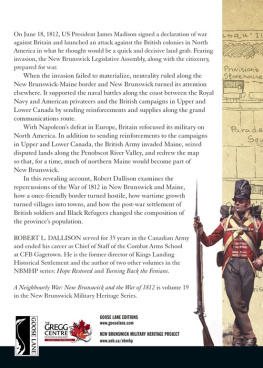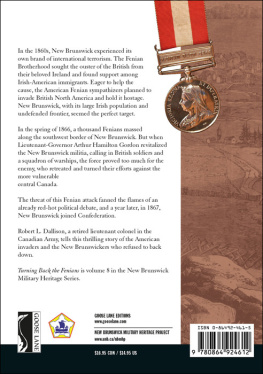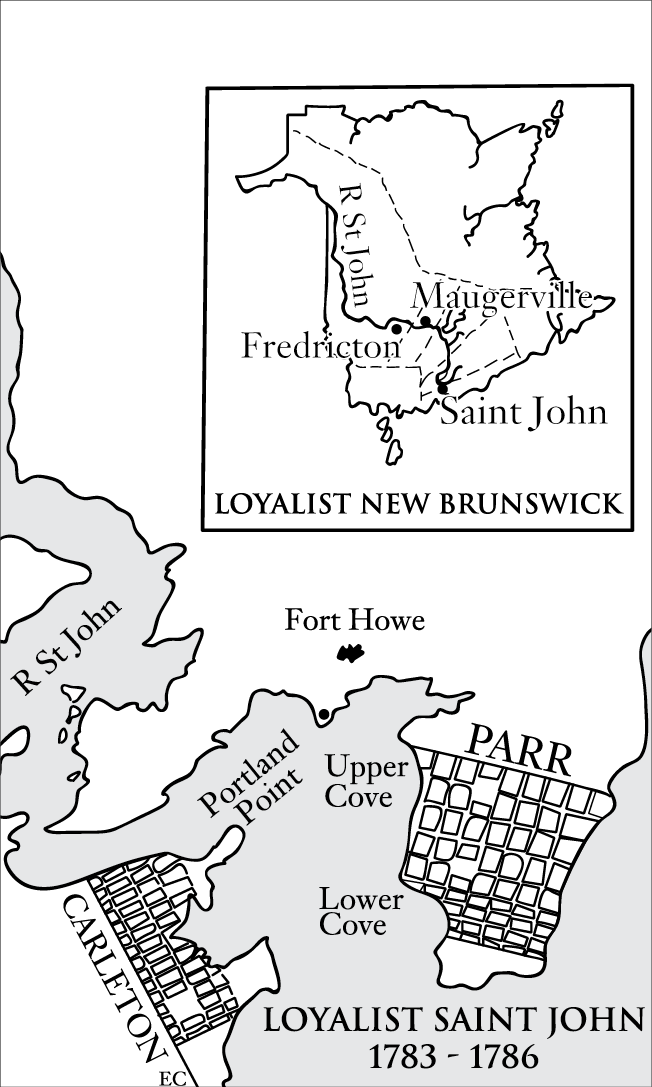I began the research presented here at the suggestion of that legendary mentor of historians of eastern Canada, George Rawlyk (193595). It saw print first as Early Loyalist Saint John (1983). As I was preparing an expanded version of that book, James Lorimer suggested that the story of the suppression of political dissent in Loyalist New Brunswick deserved telling for a wider audience. Im grateful for that suggestion, and for his willingness to publish the result. Im also pleased to be able to thank students, friends and colleagues at the University of New Brunswicks Faculty of Law for their support over many years. If some of them have wondered whether constitutional history was really law, theyve always been too polite to say so.
I am grateful to Ernest Clarke for the use of his map of Loyalist Saint John.
Introduction
Loyalist: One who professes uncommon adherence to his king.
Samuel Johnson, Dictionary of the English Language (1755)
Loyalty is a virtue. Yet somehow the title Loyalist, when applied to historical groups, takes on awkward associations. Long before the world came to disdain the stubborn Protestant Loyalists of Ireland and the forlorn Republican Loyalists of 1930s Spain, the term was a label for those who showed uncommon adherence to the cause of king and empire in the American Revolution.
When Americans refer to Loyalists they mean those who resisted the break with Britain. They were the revolutions wretched losers and, for Americans, they disappear from view at wars end. But when Canadians refer to Loyalists they mean that subset of loyal Americans who fled northward into exile between 1782 and 1784. Their advent triggered the division of Quebec and Nova Scotia and from them the creation of New Brunswick, Cape Breton and Upper Canada. It was their arrival in the future Canada which determined that northern America would be shared by two nations rather than monopolized by one.
The Loyalists considered in this book are a band of some ten thousand adherents of the Crown who found themselves trapped in and around British-occupied New York City at the end of the Revolution. Rather than face renewed persecution by the victors, they chose exile to the St. John River region of what was then western Nova Scotia.
Almost from the day in May 1783 when the first fleet of shattered Loyalists reached St. John harbour from New York, many voiced bitter dissatisfaction with their new leadership. Vulnerable and sullen, they were quick to suspect those appointed to run the new settlements of manipulating government assistance so as to favour the few at the expense of the many. In this favouritism they saw a scheme to reduce them to the status of tenants to the mighty. Loyalty to Britain was their core self-identification and very lifeline, and what they came to fear from their leaders was loyaltys antithesis, betrayal.
Britains decision in 1784 to turn the St. John River region into a colony called New Brunswick gave a hopeful appearance of new beginning. Yet it took only the calling of a provincial election to channel old grievances over insider dealing into renewed protests. Through electoral manipulation and criminal prosecutions the governing elite was able to defeat the alliance of self-made men who challenged them for power, but at what cost? Soon hundreds of Loyalist exiles affirmed their political troubles so great and their hopes for their new Loyalist colony so disappointed that they feared a new American revolution in their midst.
The story of how these suspicions and troubles began back in British-occupied New York City, of how they turned into protests almost from the day the Loyalists landed at Saint John, and of how New Brunswicks governing elite finally silenced its critics through a startling campaign of political repression is the subject of this book. It shows how, at the very founding of Canadas Loyalist province, some exiled Loyalists clung to power by branding other Loyalist exiles with the high Loyalist crime of disloyalty.
Note on Terminology
Loyal Americans trapped in the region of British-occupied New York City at the end of the American Revolution fell into two broad groups. The Refugees were civilian Loyalists. Soldiers serving in one of the several dozen military units raised in America to support the British war effort were called Provincials. Most Refugee households evacuated from New York to St. John River came as members of a militia company which, confusingly, had no military function. Evacuees to what would become the Maritime provinces were neither entitled to call themselves, nor did they call themselves, United Empire Loyalists, a distinction awarded to those who settled in the old province of Quebec.
When Loyalist transport ships arrived at St. John harbour in 1783 the area was part of Nova Scotias Sunbury County. It was not until June 18, 1784, that Britain included the St. John River valley in a province called New Brunswick. Separation from Nova Scotia became complete in November with the public reading of the commission of newly arrived Governor Thomas Carleton. By its constitutional documents New Brunswick was a British province, though more commonly it was called a colony. In 1867 New Brunswick became part of the federation called Canada.
Before 1783 the area at the mouth of the St. John River was called St. John (or St. Johns) harbour. By years end the two new Loyalist settlements on the harbours east and west sides were designated Parr-town and Carleton respectively. In 1785 both were incorporated into a city called Saint John, although the older names remained in use. As a matter of convenience, this book makes free use of the term Saint John in the period prior to formal adoption of the name.
Quotations from eighteenth-century sources preserve their original spelling and capitalization. Superscripts have been lowered and punctuation has sometimes been standardized.
Chapter 1 Our Fate Seems Now Decreed
His crime against America was breaking the tea boycott.
Young Sylvanus Whitney was a small-time trader at Stamford, in the corner of Connecticut nearest New York City. In the spring of 1775 he began quiet dealing in the East India Companys fine Bohea tea. He took this risk even as most of his neighbours fell in with Americas boycott of British tea to protest taxation of the colonies. Betrayed to Stamfords ominous Committee of Observation, Whitney was made to beg the favour of the publick to overlook this my transgression. To drive the lesson home, local Patriots summoned fifes and drums and marched the tea in grand procession to a gallows. Here they ceremoniously hanged, then burnt it.
With the usual three huzzas the mob dispersed, leaving the teas owner to ponder the message of the ashes. He had been spared tar and feathers. In return, he had pledged to behave as a true friend to my Country. But what country? At the close of the American crisis Sylvanus Whitney would lead a company of fellow Connecticut Loyalists on their voyage of exile to Nova Scotias St. John River.
In the not very distant days of Whitneys childhood, America had been ardent in its attachment to king and empire, even if British policies caused occasional head-shaking. For the chronically disunited American colonies, Britains army and navy were the only effective security against New France and its Amerindian allies. Whitney was a boy of nine in 1758 when the glorious news arrived that General Amherst had taken Louisbourg in Cape Breton, freeing New England from the French threat to the cod fishery. He was ten when word came through of Wolfes cunning conquest of the mighty fortress of Quebec. With it, the French-Amerindian encirclement of Britains continental colonies was finally smashed. How the bells rang out along the Atlantic seaboard. From the St. Lawrence valley down to the Gulf of Mexico, from the Mississippi eastward to the Atlantic, from Newfoundland to the Floridas: now all was British .

